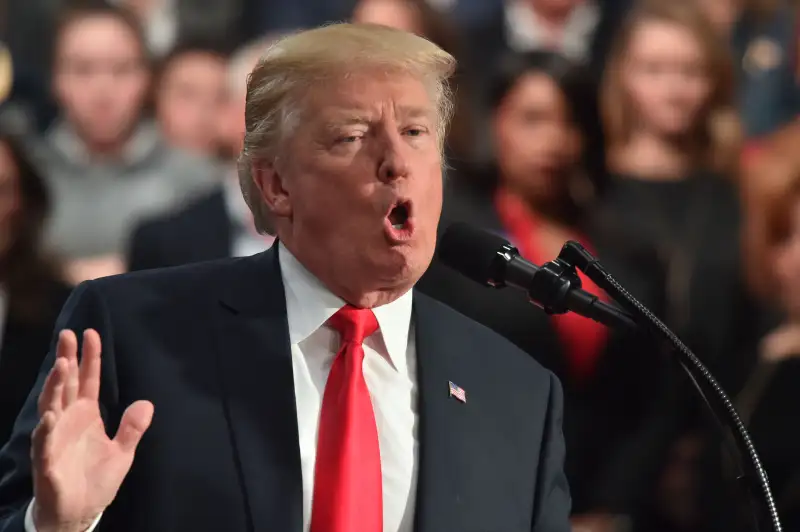3 Big Ways Donald Trump Would Personally Benefit from the GOP Tax Plan

President Donald Trump has repeatedly insisted that the GOP tax plan, expected to be ready for a vote on Friday in the Senate, would not benefit him personally.
"It’s not good for me. Believe me,” Trump said at a speech in Indiana in late September. Instead, the "the benefits are focused on the middle class, the working men and women, not the highest-income earners," such as Trump himself.
Trump repeated the message at a speech in Missouri on Wednesday of this week. "It is going to cost me a fortune, this thing," Trump said, referring to the GOP tax plan. "Believe me, believe me, this is not good for me."
Yet simply put, many tax experts do not believe him. Despite promises Trump made throughout the 2016 election campaign that he would release his tax returns, he has yet to follow through on the pledge. So it's impossible to calculate the degree to which Trump could benefit from proposed tax changes. But based on everything we do know about Trump's business interests, experts say he would clearly be further enriched if and when the GOP tax plan becomes law.
“Trump will make out like a bandit on all the big items” in the tax plan, Steven M. Rosenthal, a senior fellow at the nonpartisan Tax Policy Center, told New York Times' columnist James B. Stewart.
The White House and Trump himself dispute this characterization, insisting that at least some of the tax plan doesn't benefit the Trumps. "A lot of the deductions that he would probably normally receive may not be part of the package," White House press secretary Sarah Sanders said on Thursday. "Until there is a final piece of legislation, I can't go into much more detail. But I know that some versions of it take out a lot of those deductions that currently benefit the President and his family."
Fact checks by CNN, the Washington Post, and Politifact all say unequivocally that Trump's claims that the tax bill "is going to cost me a fortune" are untrue.
Here are three big ways that the GOP tax plan could result in a monetary windfall for President Trump and his family.
Pass-Through Business Taxes
Most businesses are so-called "pass-through" businesses, in which income is "passed through" to the owners and is taxed as individual tax income, instead of being taxed under the separate corporate tax code. Right now, the individual income rate is as high as 39.6%, but both House and Senate versions of the tax plan include special, lower rates for pass-through business owners, designed to create more parity with the corporate code. That group that includes President Trump.
"We know he makes most of his money from various licensing deals. Somebody starts a business selling suits or ties or condos, and then they pay Trump for the use of his name," NPR business reporter Jim Zarroli explained this week. "The Trump Organization is basically a collection of about 500 pass-through businesses."
Alternative Minimum Tax
The tax plan proposes a repeal of the alternative minimum tax, which "was designed to keep wealthy taxpayers from using loopholes to avoid paying taxes," in the words of TurboTax.
We know that Trump has sometimes been forced to pay the alternative minimum tax, because earlier this year Trump's 2005 tax return was made public. For that year, Donald Trump paid a federal tax rate of roughly 25% due to the alternative minimum tax. In terms of dollars, he paid $38 million in taxes on income in excess of $150 million. If the alternative minimum did not then exist, however, Trump would have paid federal taxes at a rate of only 4%, according to the Times' Stewart, saving him well over $30 million in taxes just that year.
If the alternative minimum is repealed, it's easy to see how Trump and others could regain the ability to use loopholes to slash their taxes.
Estate Tax
The current estate tax affects only 0.2% of the U.S. population—and it's only the ultra-wealthy who are impacted. As of 2016, only individuals whose entire estate is valued higher than $5.45 million are affected. When such an individual dies and passes along an estate to his or her heirs, the estate is taxed at a rate of 40%—but only on the amount that's higher than the $5.45 million exemption.
The GOP tax plans would ease the burden of the estate tax on the rich, and perhaps even eliminate the estate tax altogether. Both the House and Senate bills call for the estate tax exemption to increase to $11 million for individuals and $22 million for married couples, and the House bill is pushing for a complete repeal of the estate tax by 2024.
Obviously, such changes would be enormously beneficial to rich families such as Trumps. The New York Times has estimated that the Trump family would save more than $1 billion in taxes if the estate tax is repealed.
Taxes on the Rich in General
In addition to President Trump's claims that he personally will not benefit from the GOP's proposed changes to the tax code, he has also said that the tax plan is not aimed at helping the rich. "I think there’s very little benefit for people of wealth,” Trump said in late September. The GOP's tax plan "will protect low-income and middle-income households, not the wealthy and well-connected," he said in another speech.
But these claims also appear to be untrue, according to independent analyses. "In general, higher income households receive larger average tax cuts as a percentage of after-tax income, with the largest cuts as a share of income going to taxpayers in the 95th to 99th percentiles of the income distribution," the latest report from the nonpartisan Tax Policy Center states. "On average in 2027, taxes would rise modestly for the lowest-income group, change little for middle-income groups, and decrease for higher-income groups."
